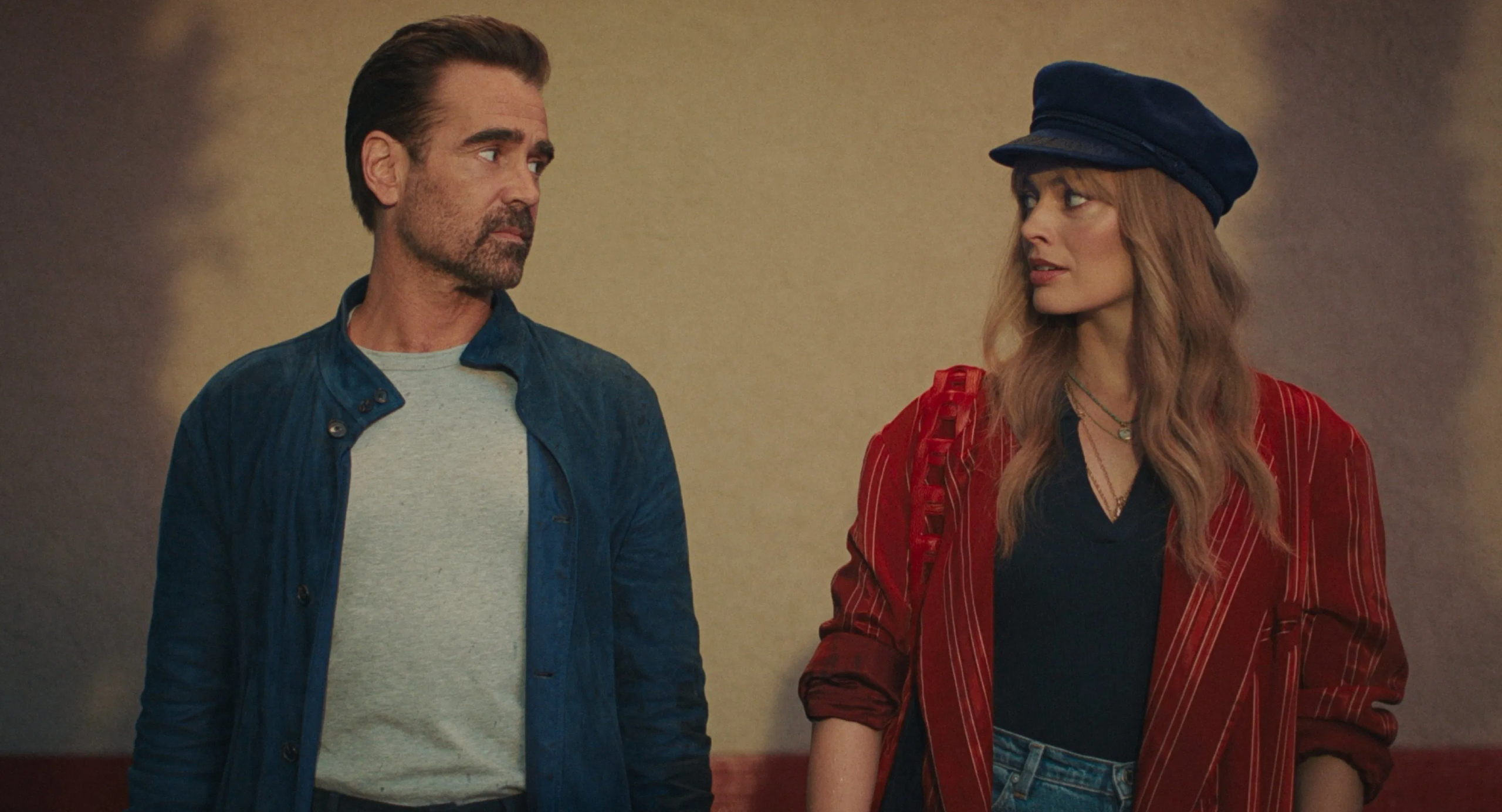A Big Bold Beautiful Journey – Film Review
Published September 21, 2025

Kogonada has always been a director fascinated by memory, connection, and the textures of time. From his meditative Columbus to the sci-fi reflection of After Yang, his films lean toward the quiet, contemplative, and poetic. With A Big Bold Beautiful Journey, written by Seth Reiss and starring Colin Farrell and Margot Robbie, he attempts to blend his stylistic precision with a more commercially accessible romantic fantasy. The result is an imaginative but uneven film—one that dazzles with moments of tenderness and creative invention but stumbles when it tries to stretch its delicate premise into a feature-length narrative.
The film introduces us to David (Colin Farrell), a man quietly burdened by regrets and unresolved relationships, and Sarah (Margot Robbie), a woman whose cheerful exterior hides a deep yearning for direction. When the two strangers cross paths, they are thrust into a fantastical odyssey where they revisit moments from their pasts. These aren’t just memories—they are tactile, immersive recreations that allow them to step into their most formative experiences, to walk among the ghosts of their younger selves, and to consider whether altering these moments might lead to different futures.
The conceit is simultaneously high-concept and deeply personal. Much of the film’s success rests on how well it weaves together surreal fantasy sequences with grounded human emotion. Some of these scenes are genuinely moving, but others play more like whimsical detours than essential stepping stones, testing the audience’s patience.
Colin Farrell, coming off a streak of nuanced performances in projects like The Banshees of Inisherin and The Penguin, once again proves his ability to balance humor with melancholy. His David is both wryly self-aware and quietly haunted, a man who isn’t sure whether he wants to rewrite his life or simply understand it. Margot Robbie brings a vibrant counterpoint as Sarah. Her natural charisma lights up the screen, but she also digs into the vulnerabilities beneath Sarah’s charm, particularly in her scenes with Lily Rabe as her mother. Their dynamic provides some of the film’s most heartfelt beats.
Kevin Kline makes an impression in a relatively small but pivotal role as “The Mechanic,” a mysterious figure who seems to pull the strings of this fantastical journey. His presence lends the film a slightly theatrical air, a reminder that this is not meant to be realism but a fable about choice and consequence. Phoebe Waller-Bridge, meanwhile, pops up as a cashier whose playful banter with the leads provides a welcome injection of wit, even if her role is brief.
As expected from Kogonada, the film is a visual feast. He and cinematographer Benjamin Loeb create striking compositions that blur the line between reality and dreamscape. It’s probably one of the best-looking movies of the year thus far, and that should come as no surprise. There’s plenty of gorgeous colors on-screen, and the framing is excellent, too.
These stylistic flourishes give the film a tactile beauty, yet they sometimes overshadow the storytelling. Where Kogonada’s earlier works found harmony between mood and narrative, A Big Bold Beautiful Journey occasionally feels more interested in aesthetic experimentation than in propelling its characters forward. The film risks drifting, much like its protagonists.
Reiss’s screenplay clearly aims to balance whimsy with emotional heft. The humor often lands, particularly in the interactions between David and Sarah as they awkwardly navigate the absurdity of their situation. Farrell and Robbie have a natural chemistry that keeps the banter engaging, and the lighter moments prevent the film from sinking under the weight of its themes.
Yet the script also struggles with tonal consistency. For every poignant confrontation with the past, there’s a sequence that feels like narrative filler—a quirky vignette that doesn’t fully tie back into the characters’ journeys. While Kogonada’s meditative pacing worked in films that were more grounded, here it risks diluting the impact of the central romance.
The most resonant aspect of A Big Bold Beautiful Journey lies in its exploration of how people live with regret. The film doesn’t suggest that David and Sarah can rewrite their lives; instead, it implies that the act of revisiting these moments is less about change and more about acceptance. In this way, the film recalls other recent works about memory and identity, but filtered through Kogonada’s gentle, almost spiritual sensibility.
This thematic ambition, however, is sometimes undercut by the narrative’s looseness. By the third act, the film attempts to bring its whimsical digressions into sharper focus, but the resolution feels rushed. Viewers may walk away appreciating the message without feeling entirely satisfied by the story’s mechanics.
Despite its flaws, A Big Bold Beautiful Journey lingers in the mind. Its title is both ironic and sincere—big in ambition, bold in its stylistic flourishes, and beautiful in its most tender moments. Farrell and Robbie anchor the film with performances that feel lived-in, while Kogonada continues to prove himself a filmmaker of remarkable sensitivity.
Still, the film doesn’t fully escape the trap of being more interesting in concept than in execution. It’s neither as emotionally searing as Columbus nor as thematically cohesive as After Yang. For every breathtaking image, there’s a narrative gap that leaves the viewer more contemplative than moved.
A Big Bold Beautiful Journey is a film of contradictions. It is both charming and frustrating, poetic and indulgent, heartfelt and meandering. Those who admire Kogonada’s unique approach to filmmaking will find much to appreciate, especially in the film’s visual language and its tender performances. Others may find the story too slight to sustain its runtime, wishing that its fantastical premise had been developed with more narrative rigor.
As a romantic fantasy, it works best as a mood piece—an invitation to reflect on memory, love, and the choices that define us. While it doesn’t quite achieve greatness, it leaves behind enough moments of wonder and intimacy to warrant the journey.
